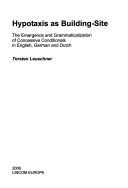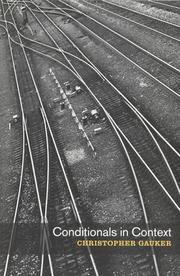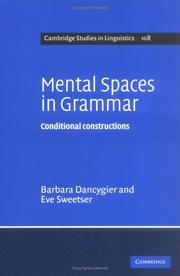| Listing 1 - 6 of 6 |
Sort by
|
Book
ISBN: 9780198860662 0192604775 0198860668 9780192604774 0191893390 0192604767 Year: 2020 Publisher: Oxford Oxford University Press
Abstract | Keywords | Export | Availability | Bookmark
 Loading...
Loading...Choose an application
- Reference Manager
- EndNote
- RefWorks (Direct export to RefWorks)
What does 'if' mean?It is one of the most commonly used words in the English language, in itself a sign to the importance of conditional thinking to human cognitive life. We make conditional statements, ask conditional questions, and issue conditional orders. We need to think and talk conditionally for many purposes, from everyday decision-making to mathematical proof. Yet the meaning of conditionals has been debated for thousands of years.Suppose and Tell brings together ideas from philosophy, linguistics, and psychology to present a controversial new approach to understanding conditionals. It argues that in using 'if' we rely on psychological heuristics, methods which are fast and frugal and mostly, but not always, reliable. As a result philosophers and linguists have been led astray in theorizing about conditionals through trusting faulty data generated by such methods and prematurely rejecting simple theories on the basis of merely apparent counterexamples. Williamson shows how one such simple theory of conditionals can explain the data, and draws wider implications for the nature of meaning and its non-transparency to native speakers, vagueness in thought and language, and the need for semantics to attend to the unreliable heuristics underlying our judgments.
Lexicology. Semantics --- Pragmatics --- Grammar, Comparative and general --- Conditionals --- Grammar, Comparative and general - Conditionals --- Semantics
Book
ISBN: 9780199233298 0199233292 Year: 2010 Publisher: Oxford ; New York Oxford University Press
Abstract | Keywords | Export | Availability | Bookmark
 Loading...
Loading...Choose an application
- Reference Manager
- EndNote
- RefWorks (Direct export to RefWorks)
The conditional, if...then, is probably the most important term in natural language and forms the core of systems of logic and mental representation. It occurs in all human languages and allows people to express their knowledge of the causal or law-like structure of the world and of others' behaviour, e.g., if you turn the key the car starts, if John walks the dog he stops for a pint of beer; to make promises, e.g., if you cook tonight, I'll wash up all week; to regulate behaviour, e.g., if you are drinking beer, you must be over 18 years of age; to suggest what would have happened had things been different, e.g., if the match had been dry it would have lit, among many other possible uses. The way in which the conditional is modelled also determines the core of most logical systems. Unsurprisingly, it is also the most researched expression in the psychology of human reasoning. Cognition and Conditionals is the first volume for over 20 years (On Conditionals, 1986, CUP) that brings together recent developments in the cognitive science and psychology of conditional reasoning. Over the last 10 to 15 years, research on conditionals has come to dominate the psychology of reasoning providing a rich seam of results that have created new theoretical possibilities. This book shows how these developments have led researchers to view people's conditional reasoning behaviour more as succesful probabilistic reasoning rather than as errorful logical reasoning. It shows how the multifarious, and apparently competing, theoretical positions developed over the last 50 years in this area - mental logics, mental models, heuristic approaches, dual process theory, and probabilistic approaches-have responded to these insights. Its organisation reflects the view that an integrative approach is emerging that may need to exploit aspects of all these theoretical positions to explain the rich and complex phenomenon of reasoning with conditionals. It includes an introductory chapter relating the development of the psychology of reasoning to developments in the logic and semantics of the conditional. It also includes chapters by many of the leading figures in this field. Cognition and Conditionals will be a valuable resource for cognitive scientists, psychologists and philosophers interested how people actually reason with conditionals.
Cognitive psychology --- Logic --- Psycholinguistics --- Grammar, Comparative and general --- Logic. --- Thought and thinking. --- Thinking. --- Cognition. --- Linguistics. --- Conditionals. --- Thought and thinking --- Cognition --- Linguistics --- Conditionals --- Grammar, Comparative and general - Conditionals

ISBN: 389586353X 9783895863530 Year: 2006 Volume: 24 Publisher: Muechen : Lincom Europa,
Abstract | Keywords | Export | Availability | Bookmark
 Loading...
Loading...Choose an application
- Reference Manager
- EndNote
- RefWorks (Direct export to RefWorks)
Anglais (langue) --- Allemand (langue) --- Néerlandais (langue) --- Grammaire comparée --- Conditionnel (linguistique) --- English language --- German language --- Grammar, Comparative and general --- Conditionals --- English language - Conditionals --- German language - Conditionals --- Grammar, Comparative and general - Conditionals
Book
ISBN: 9780262019484 9780262519649 026251964X Year: 2013 Volume: 65 Publisher: Cambridge MIT press
Abstract | Keywords | Export | Availability | Bookmark
 Loading...
Loading...Choose an application
- Reference Manager
- EndNote
- RefWorks (Direct export to RefWorks)
In this book, Michela Ippolito proposes a compositional semantics for subjunctive (or would) conditionals in English that accounts for their felicity conditions and the constraints on the satisfaction of their presuppositions by capitalizing on the occurrence of past tense morphology in both antecedent and consequent clauses. Very little of the extensive literature on subjunctive conditionals tries to account for the meaning of these sentences compositionally or to relate this meaning to their linguistic form; this book fills that gap, connecting the different lines of research on conditionals. Ippolito’s proposal will be of interest both to linguists and to philosophers concerned with conditionals and modality more generally.Ippolito reviews previous analyses of counterfactuals and subjunctive conditionals in the work of David Lewis, Robert Stalnaker, Angelika Kratzer, and others; considers the contrast between future simple past subjunctive conditionals and future past perfect subjunctive conditionals; presents a proposal for subjunctive conditionals that addresses puzzles left unsolved by previous proposals; reviews a number of presupposition triggers showing that they fit the pattern predicted by her proposal; and discusses an asymmetry between the past and the future among subjunctive conditionals, arguing that the best account of our linguistic intuitions must include an indeterministic view of the world.
Grammar --- Grammar, Comparative and general --- Modality (Linguistics) --- Semantics. --- Formal semantics --- Semasiology --- Semiology (Semantics) --- Comparative linguistics --- Information theory --- Language and languages --- Lexicology --- Meaning (Psychology) --- Linguistics --- Conjunctive mood --- Subjunctive mood --- Conditionals (Grammar) --- Hypothetical clauses (Grammar) --- Protasis (Grammar) --- Conditionals. --- Subjunctive. --- Mood --- Conditional clauses --- Conditional constructions --- Conditional sentences --- Hypothetical clauses --- Protasis --- Sentences --- Semantics --- Conditionals --- Subjunctive --- Philology --- Grammar, Comparative and general - Conditionals --- Grammar, Comparative and general - Subjunctive

ISBN: 0262572311 9780262572316 Year: 2005 Volume: 5 Publisher: Cambridge (Mass.) MIT press
Abstract | Keywords | Export | Availability | Bookmark
 Loading...
Loading...Choose an application
- Reference Manager
- EndNote
- RefWorks (Direct export to RefWorks)
"If you turn left at the next corner, you will see a blue house at the end of the street." That sentence―a conditional―might be true even though it is possible that you will not see a blue house at the end of the street when you turn left at the next corner. A moving van may block your view; the house may have been painted pink; a crow might swoop down and peck out your eyes. Still, in some contexts, we might ignore these possibilities and correctly assert the conditional. In this book, Christopher Gauker argues that such context-relativity is the key to understanding the semantics of conditionals. Contexts are defined as objective features of the situation in which a conversation takes place, and the semantic properties of sentences―conditionals included―are defined in terms of assertibility in a context. One of the primary goals of a theory of conditionals has to be to distinguish correctly between valid and invalid arguments containing conditionals. According to Gauker, an argument is valid if the conclusion is assertible in every context in which the premises are assertible. This runs counter to what Gauker sees as a systematic misreading of the data by other authors, who judge arguments to be invalid if they can think of a context in which the premises are judged true and some other context in which the conclusion is judged false. Different schools of thought on conditionals reflect fundamentally different approaches to semantics. Gauker offers his theory as a motive and test case for a distinctive kind of semantics that dispenses with reference relations and possible worlds.
Grammar, Comparative and general --- Language and languages --- Conditionals --- Philosophy --- 801.56 --- 801.56 Syntaxis. Semantiek --- Syntaxis. Semantiek --- Conditionals (Grammar) --- Hypothetical clauses (Grammar) --- Protasis (Grammar) --- Conditional clauses --- Conditional constructions --- Conditional sentences --- Hypothetical clauses --- Protasis --- Mood --- Sentences --- Conditionals (Logic) --- Linguistics --- Philology --- Grammar, Comparative and general - Conditionals --- Language and languages - Philosophy

ISBN: 9780521103244 9780521844680 0521844681 9780511486760 0511126255 9780511126253 0511125399 9780511125393 0511486766 0511182325 9780511182327 1107151988 1280458364 0511199759 0511300301 052110324X Year: 2005 Volume: 108 Publisher: Cambridge, UK New York Cambridge University Press
Abstract | Keywords | Export | Availability | Bookmark
 Loading...
Loading...Choose an application
- Reference Manager
- EndNote
- RefWorks (Direct export to RefWorks)
Conditional constructions have long fascinated linguists, grammarians and philosophers. In this pioneering new study, Barbara Dancygier and Eve Sweetser offer a new descriptive framework for the study of conditionality, broadening the range of richly described conditional constructions. They explore theoretical issues such as the mental-space-building processes underlying conditional thinking and the form-meaning relationship involved in expressing conditionality. Using a broad range of attested English conditional constructions, the book examines inter-constructional relationships. Within the framework of Mental Spaces Theory, shared parameters of meaning are shown to be relevant to conditional constructions generally, as well as related temporal and causal constructions. This significant contribution to the field will be welcomed by a wide range of researchers in theoretical and cognitive linguistics.
801.56 --- 801.56 Syntaxis. Semantiek --- Syntaxis. Semantiek --- Conditionals. --- Cognitive grammar --- Grammar, Comparative and general --- Semantics --- Formal semantics --- Semasiology --- Semiology (Semantics) --- Comparative linguistics --- Information theory --- Language and languages --- Lexicology --- Meaning (Psychology) --- Conditionals (Grammar) --- Hypothetical clauses (Grammar) --- Protasis (Grammar) --- Cognitive linguistics --- Psycholinguistics --- Conditionals --- Conditional clauses --- Conditional constructions --- Conditional sentences --- Hypothetical clauses --- Protasis --- Mood --- Sentences --- Lexicology. Semantics --- Grammar --- Cognitive grammar. --- Semantics. --- Arts and Humanities --- Language & Linguistics --- Linguistics --- Philology --- Grammar, Comparative and general - Conditionals.
| Listing 1 - 6 of 6 |
Sort by
|

 Search
Search Feedback
Feedback About UniCat
About UniCat  Help
Help News
News